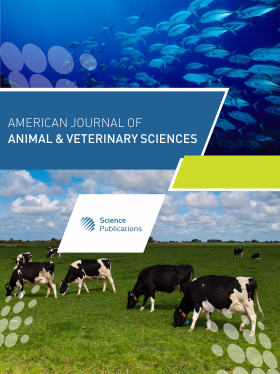Dietary Beta-1,3/1,6-Glucans Reduce Clinical Signs of Canine Atopy
- 1 Rajamangala University of Technology Isan, Thailand
- 2 University of Applied Sciences Van Hall Larenstein, Netherlands Antilles
- 3 University of Applied Sciences HAS Den Bosch,‘s Hertogenbosch, Netherlands Antilles
Abstract
Problem statement: There was evidence that beta-1,3/1,6-glucans modulate inflammatory activity. In an open, non-controlled trial, purified beta-1,3/1,6-glucans were found to improve the clinical signs of dogs with undefined chronic skin disorders. Given the design of that study, further work was required on the efficacy of beta-1,3/1,6-glucans in the treatment of canine atopy. Approach: The influence of a purified preparation of beta-1,3/1,6-glucans (MacroGard®) on canine atopy was assessed in a double-blind, placebo-controlled trial. Privately owned dogs were used and the clinical signs of atopic dermatitis were evaluated by the owners. For a period of 8 weeks, the dogs daily received a complete dry food without (n = 16) or with 800 ppm beta-1,3/1,6-glucans (n = 15). During the trial, all dogs were treated three times with the use of a flea remedy in order to exclude any influence of flea-bite allergy. To assess the severity of atopic dermatitis, the clinical signs scored were itching, redness, scaling, thickening and stripping of skin. Results: For all five clinical signs, the group-mean improvement, expressed as change of severity score over time, was greater in the test group than in the controls. Within each group, the changes for the five clinical signs were added up to arrive at an overall index of improvement of atopic dermatitis. The extra improvement caused by the ingestion of beta-1,3/1,6-glucans was 63%. The difference between the pooled group-mean changes of the scores for the control and test dogs was statistically significant (P<0.001). To correct for the differences in baseline scores, dose equivalents required for the observed change between baseline and final scores were calculated. It was found that the dose equivalents for the combined placebo and treatment effects seen in the test group were much greater than those required for the placebo effect in the control group. Conclusion: Beta-1,3/1,6-glucans can be considered safe and it is put forward that a dose of 800 ppm in a dry food is beneficial for dogs with atopic dermatitis.
DOI: https://doi.org/10.3844/ajavsp.2011.146.152

- 5,145 Views
- 6,134 Downloads
- 8 Citations
Download
Keywords
- Atopic dermatitis
- canine atopy
- skin disorders
- dietary treatment
- functional ingredient
- betaglucans
- double-blind
- placebo-controlled trial
